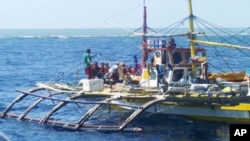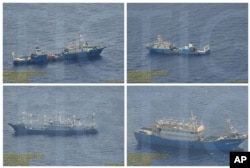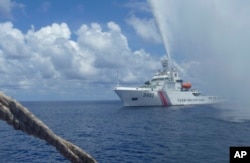On his first voyage as captain, Philippine fisherman Joel Banila was more worried about being battered by Chinese coast guard ships than he was about the impending storm on the horizon in the South China Sea.
His was one of the first boats to gamble on the big catches available in and around the disputed Scarborough Shoal since Philippine President Rodrigo Duterte made surprise overtures toward China, which sees the area as its sovereign territory.
For four years, Chinese ships have blockaded the tranquil lagoon rich in fish stocks and forced fishermen from the Philippines to travel farther for smaller catches, reflecting tensions in the South China Sea, where several countries have overlapping claims.
Frosty relations between China and the Philippines have improved markedly, however, as Duterte shifts away from traditional ally Washington and closer to Beijing, and some fishermen have decided to take a calculated risk.
"I felt a bit nervous because it was my first time serving as captain," Banila, 32, told Reuters, a day after making the 10-hour, 124-mile journey back to the shores of the northwest Philippines.
"We heard what happened before, that they [Chinese ships] ram the boats, so I was moving slowly around the shoal, but nothing happened."
China: No change
There has been considerable confusion at sea since Duterte's diplomatic shift, with China's foreign ministry saying this week that the situation at Scarborough Shoal "has not changed and will not change."
Philippine officials said fishermen could return, but confirmed no agreement had been reached when Duterte visited Beijing two weeks ago in search of investment, trade and unimpeded access to the shoal.
Duterte's outreach has stunned the region, coming just months after an arbitration tribunal in The Hague ruled in favor of the Philippines in a case it lodged in 2013 to challenge not only China's control of the rocky outcrop but also the legality of its man-made islands and vast maritime claims.
"We heard there was a [Philippine] boat there, so we also tried go to Scarborough," Banila said.
Some bountiful catches
The situation is far from certain at the shoal, which the arbitral ruling said should be shared by all claimants, and no one country had sovereign rights to it. China has rejected the tribunal's findings.
The Philippine defense minister and the president's spokesman on Friday said Chinese ships had withdrawn from the area. Within two days, defense and coast guard officials said Chinese were still there, but had scaled back their presence since Duterte's visit.
Some fishermen have returned with big smiles and bountiful catches, reporting no interference from the Chinese as they accessed the lagoon. Among them was Cornel Garnel, who got back last week.
"Before, when fishermen tried to fish there, they were driven away by water cannon," he said.
Satellite imagery taken on Saturday by the Asia Maritime Transparency Initiative and the Center for Strategic and International Studies, however, showed fishermen were not entering the shoal itself and were working on its periphery, with China's coast guard still present.
Banila said he spotted four Chinese ships, one at the mouth of the lagoon and three circling the area. His boat stayed outside, following the advice of other fishermen.
"We were close enough for us to see them, but we can't go inside, only outside," he added.
Leniency, but anxiety
Laureano Artagame, a senior fisheries management official in Subic, said it was "unacceptable" that Chinese ships had let Filipinos shelter at the shoal during a typhoon, but made them leave afterward.
"There is already a decision by the international arbitral court ... so why are the Chinese still there?" he said. "Yes, there's some leniency now, there's no more harassment. But there is still anxiety. They still worry."
Artagame said the blockade meant fishermen had to be at sea three times longer to catch the kind of volumes of fish they would at Scarborough.
He said fishermen were unhappy with the diplomatic ambiguity, and he planned to meet representatives of Duterte's government soon to push for answers.
"One of the things we will talk about ... is to really ask the government, 'Is there a clear agreement opening the Scarborough? And why are they still blocking the entrance?' " he said.







